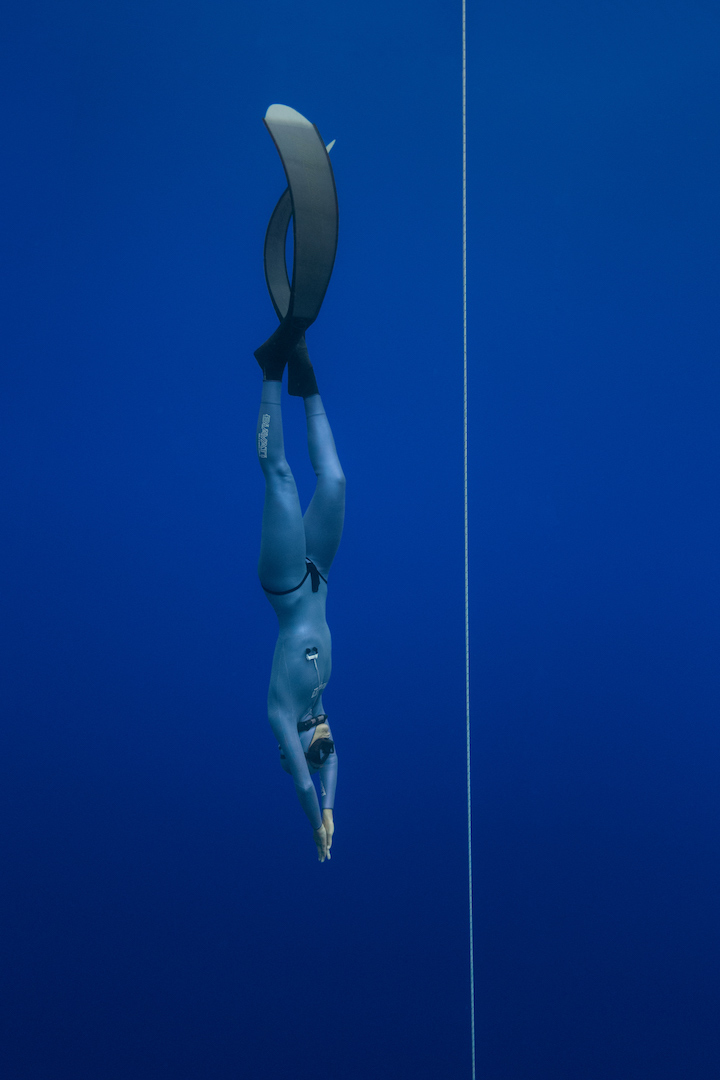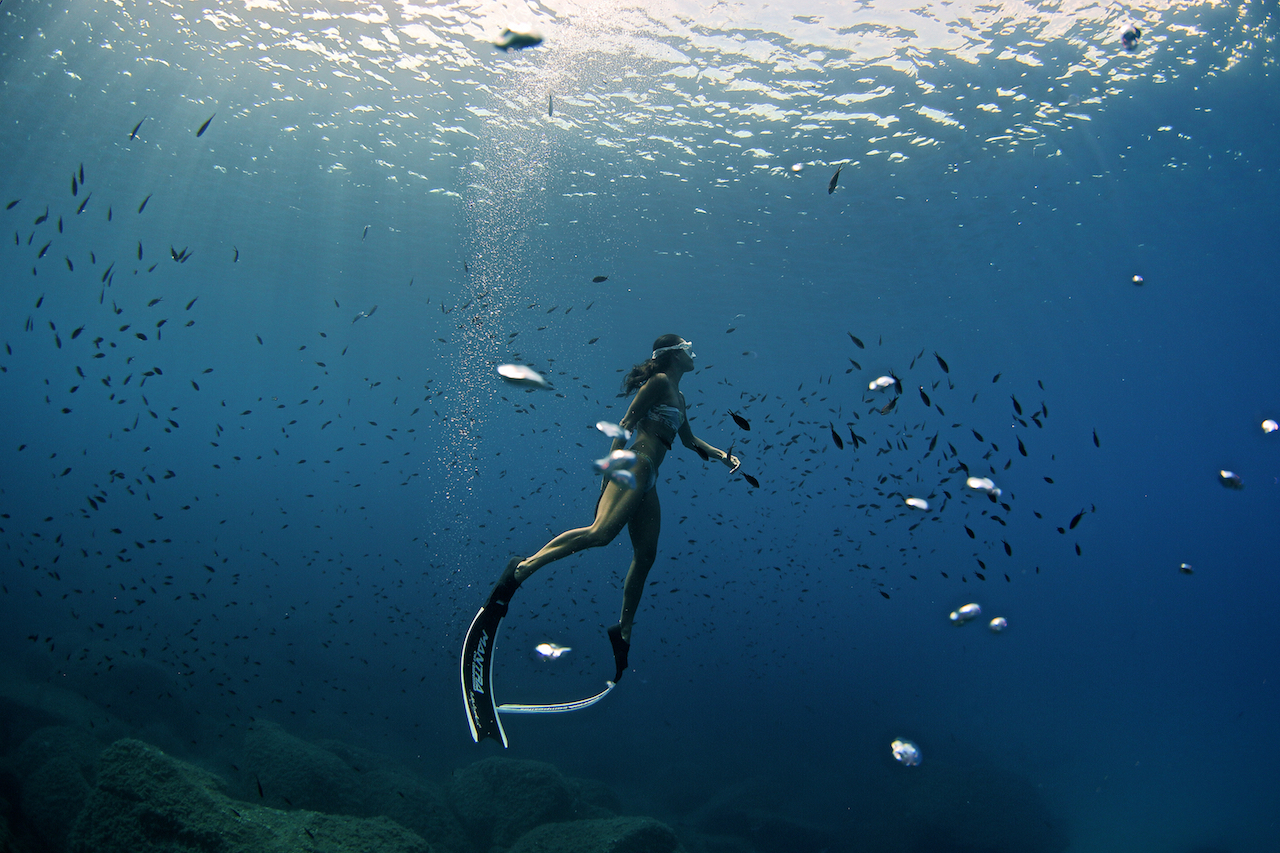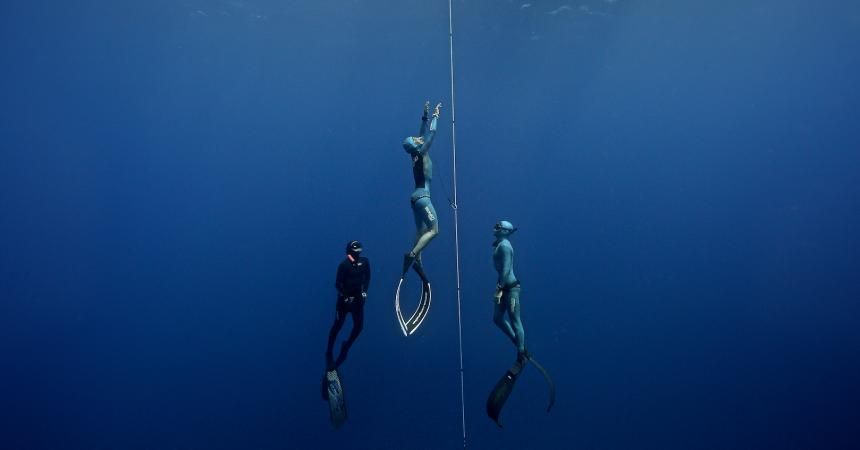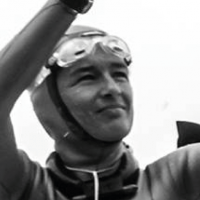Fear is a natural feeling, as much part of human nature as the likes of hunger, thirst…and it’s essential to survival. We would have died a thousand times over without fear holding us back. This extraordinary survival mechanism becomes even more important when we are practising a risky activity like freediving. More so, it is fear itself which helps us maintain an optimal level of attention, and helps us perform all tasks in the best possible manner. It can, however, become an obstacle when it takes over; it can freeze us, paralyze us, and it can lead us to mistakes…all that can happen if we allow the ‘’fear’’ emotion to take over, if we lose control of the situation.
Just think about how many world-class footballers, from Baggio onwards, failed to score decisive penalties during World Cup finals. They had successfully scored penalties innumerable times, but, that day, their dread prevailed.
Did you ever happen to visualize fear as an overwhelming weight whenever thinking about it? That is just the kind of thought which leads us to run, as our instinct often leads us to run away from our worries, to evade our limits, maybe to avoid thoughts of failure by confronting ourselves with our limitations…I’m scared, so I just turn around and run. After all, one wonders: why should I face my fears?
-
We must, so as not to allow them to gain advantage and to rule our lives
-
We must, so as to gain the ability to discover what lies on the other side, once we go past them, and help us overcome them in the future
-
And because, unless we get better, our destiny is to get progressively worse
What is the best way to face our fears? In my case, what proved essential was to learn to welcome them, and to realize we are ‘’equals’’: I am worth as much as my fears, in fact I am worth more. I had to learn how to avoid being scared ‘’of being scared’. And, if your limitations are all in your mind, learning to accept that we do not have limitations becomes a journey across one’s own fears. Nothing is impossible, but we need first of all the will, and then the ability, to embrace our fears and limitations, respectfully but without being afraid, which will in turn help us to formulate the right strategy to overcome them. At times we might fail, but giving it a go is the only way to grow.
As a matter of fact, freediving offers a great opportunity to recognise and face fear, in all its shapes and forms. In fact, thinking about it, the highest meaning of the challenge offered by extreme sports can be found in the fact that they make us face our fears, they make us deconstruct them and analyse them; we get the chance to recognize our own limits, and to separate mental and technical limitations, and lay the foundations to succeed where we first failed, and therefore turn our failures into possibilities. I have been afraid so many times, and of so many different things… afraid of failure, afraid of betraying expectations, of getting it wrong, and even afraid of dying. There are substantiated fears, which are born and die within a specific episode and are linked to ‘’incidents’’, unforeseen circumstances or difficulties experienced in the deep; and there are generic fears, rooted in our souls, which survive outside the realm of reality and rationality. The second kind are obviously the hardest to overcome, in our life above and under the water surface, because they are not defined within a precise contest or event, and are therefore difficult to analyse or fully comprehend. By carefully dissecting my fears, maybe with some time on my side, I have found that they tend to hide personal malaise, tiredness, difficulty at concentrating. As an example, every single worryI have ever experienced whilst preparing for a competition, starts fading during, and completely disappears after the same competition is over.

It is the norm that the dive I perform straight after the end of a competition season is going to be completely free of all those fears I felt so strongly up to a week before. Every single one of my fears has helped me to grow as an individual even before helping me become a better freediver, and I have kept rediscovering a stronger and stronger attraction towards the deep, towards the sea and the infinite possibilities of growth the whole scenario has to offer.
I have learnt to handle freediving in a more conscious and informed manner, leaving little space to improvisation and approximation: everything is prepared and carried out following the highest safety standards and with the maximum respect for extreme conditions and the personal circumstances specific to my overall fitness state on any given day. I have learnt to back down whenever necessary. I have learnt I have no limitations, but also that I need time to explore this unlimited territory.
Chiara Obino
Medico dentista, mamma di due bimbe di 8 e 10 anni e una pluriprimatista mondiale di Apnea, tutt’ora in attività, nella disciplina dell'Assetto Costante.
E' membro della Nazionale Italiana Federale (FIPSAS).
Nel 2019 alla Caribbien Cup a Roatan (Honduras) vince la medaglia di bronzo con un tuffo a 100 metri di profondità con la monopinna nella gara vinta da Alessia Zecchini. Si classifica terza ai campionati del mondo con le due pinne, realizzando il nuovo record italiano in questa disciplina.
Ha vinto: 8 campionati italiani assoluti - 1 Oro , 1 Argento e 1 bronzo ai Campionati del Mondo. Ha realizzato 3 Record del Mondo e 8 record italiani. È stata insignita di 1 Medaglia d'Oro e 1 Medaglia di Bronzo al valore sportivo.
Pagina Facebook: Chiara Obino - dallo sport alla vita, dalla vita allo sport
Canale YouTube: Chiara Obino



